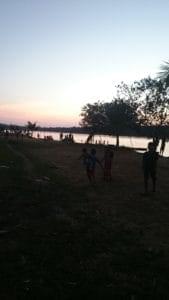The Inter-ethnic Forum, the Indigenous Board and the Dioceses’ of Quibdó, Istmina and Apartadó and many NGOs in Colombia, like ABColombia’s partner, the Inter-Church Commission for Justice and Peace (Comision Intereclesial de Justicia y Paz) have raised their concerns about the forced displacement of Indigenous Communities across Chocó.
Many communities in Chocó are being forced to displace due to combats between the ELN and neo-paramilitary group the Autodefensas Gaitanistas de Colombia (AGC) [1]. These combats are a part of a fight to control strategic locations for coca cultivation, processing and commercialisation and mechanised small-scale gold mining in areas abandoned by the FARC guerrilla when they moved into the Transitional and Normalisation Zones (TNZ) to disarm. Despite the Early Warning Alerts and the presence of a Joint Task Force TITAN (Navy, Army and Air Force) based in Choco [2], no effective methods were put in place to help protect the local population and to prevent the displacement. TITAN have a force of over 2,500 troops based in Chocó.
These neo-paramilitaries threaten and perpetuate violence against rural communities and their leaders. They confine the movement of communities, are using antipersonnel mines, generating forced displacement all of which is contributing to the humanitarian Crisis in Colombia, and intensifying the situation of poverty and marginalisation of the population of Chocó.
Wounaan Indigenous Peoples
On 24 and 25 March 2017, the Wounaan Indigenous Peoples were caught in the crossfire of an armed confrontation between the ELN and AGC resulting in over 120 families, about 500 people from the Wounaan and Embera Indigenous Communities in Truandó from Join Puur, Kiparadó La Loma resguardo (Reserve) Wounaan and Embera, were forced to flee for their lives to the nearest town of Riosucio to seek refuge.
This is the latest in a series of forced displacements suffered by the Wounaan indigenous people in 2017:
- On 12 February, the Wounaan Tribe living in Santa Rosa de Guayacán in the department of Valle de Cauca fled to the town of Buenaventura, the Wounaan in this region are partners of Christian Aid an ABColombia member;
- On 21 February, another group of the Wounaan fled from Chagpien Tordó (Litoral San Juan, Chocó).
Following the displacement on 24 and 25 March 2017 the UN Refugee Agency (UNHCR) undertook a humanitarian mission in conjunction with the municipal administration of Riosucio, the town Ombudsman and Unidad para las Víctimas. The combined mission of these organisations confirmed the critical situation and the imminent risk of further displacement for local indigenous communities. The UNHCR has called for local, departmental and state entities to work to provide effective humanitarian attention to the affected communities and reiterated its willingness to support the State in doing this.
The Inter-Ethnic Forum, the Indigenous Board and the Dioceses’ of Quibdó, Istmina and Apratadó, called on the Colombian State to implement “mechanisms of protection for the inhabitants of Chocó, including regaining control the arms trade … The Colombian population expects visible results from the disarmament and dismantling of paramilitaries and other criminal groups. As long as the public perceives leniency towards illegal armed forces on the part of the State, the peace process will lose credibility.”
The UNHCR, has also asserted that the humanitarian response to the situation by the State was neither sufficient nor secure.
On 26 March 2017, the State Ombudsman’s Office (Defensoría del Pueblo) issued the Government with an “Early Warning Alert” [3] notifying them of the presence of AGC and the ELN in the department of Chocó. The Defensoría warned that, according to their analysis of the situation on the ground, there was the imminent possibility of further:
• armed confrontations with the civilian population caught in the crossfire
• confinements and damage to personal integrity and life due to antipersonnel mines
• mass forced displacements of about 4,000 people
• forced recruitment of children
• sexual and gender-based violence
Recommendations to the Government of Colombia
- To urgently implement measures in Choco to address the Humanitarian and Security Crisis, and to consult civil society organisations and the Dioceses’ of Quibdó, Istmina and Apratadó on the measures that will most effectively increase security for the citizens of Choco
- To immediately implement the Point 3.4 the Security Guarantees’ Chapter of the Peace Accord and ensure that the financial and political structures supporting paramilitarism in Colombia are dismantled;
- To undertake an internal review and purification process of the Security Forces;
- Initiate an inter-institutional and intersectoral working group to formulate a specific plan to and allocate sufficient resources to address the issues of unemployment, education, health and public services in the marginalised region of Choco.
References
[1] The Neo-Paramilitary Groups grew out of the mid-ranking Autodefensas Unidas de Colombia (AUC) that did not demobilise in 2005. The neo-paramilitary groups are referred to by the Colombian Governemnt as Criminal Gangs (BACRIM)
[2] “En algunas regiones de Chocó falta más compromiso de la Fuerza Pública”: obispo de la Diócesis de Quibdó. Interview in El Espectador; Article from Chocó Territorio de Etnías
[3] Informe de riesgo de inminencia1 N° 009-17, para las comunidades afrodescendientes e indígenas que habitan en la cuenca del río Truandó: los Consejos Comunitarios La Nueva, Clavellino, Dos Bocas, Bocas de Taparal, Truandó Medio y Quiparadó. Así mismo, las personas indígenas habitan en los Resguardos Río Quiparadó, Jagual Chintadó y Peña Blanca del municipio Riosucio, departamento del Chocó.
For more information please see the following links:
Further links: Truandó, Chocó: Desplazmiento de indígenasFurther information on the Joint Task Force TITAN (Fuerza de Tarea Conjunta- TITAN)

